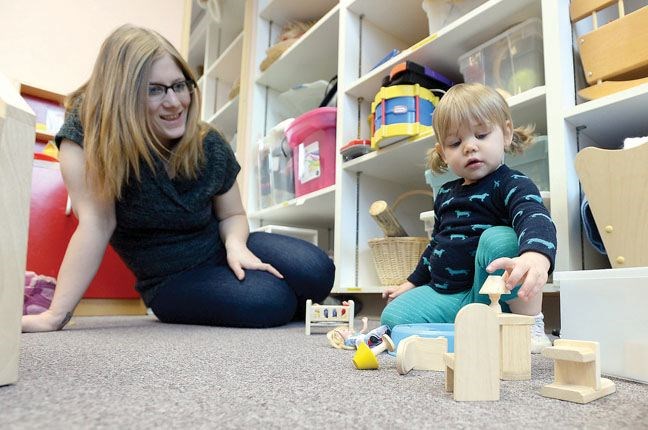Part 1 of 2
Mental wellness is something people often become aware of in young adulthood, but a growing number of advocates are stressing the need to focus on the mental health of infants and young children.
According to Prince George child psychiatrist Dr. Rachel Boulding, ensuring fetuses in utero, newborns and toddlers have access to mental health supports will give them some of the important building blocks they need to develop their brains properly.
"What we're finding is what predicts children's successes more is their social and emotional abilities," Boulding said. "That's what in fact inhibits a child's ability to be in school is that they can't play, share, get along with other children, they can't pay attention, they can't amuse themselves and therefore they can't learn from the world around them because they're not able to manage themselves."
Doctors, social workers and other professionals who deal with children have been talking about the importance of infant mental health for years, but the discussion has yet to seep into the general public. Even among some groups of professionals, the conversations are sometimes more theoretical than practical.
"The field is kind of in its infancy," Boulding said.
Because infants can't speak for themselves, research has focused on the importance of attachment and how a secure connection with one person seems to benefit the emotional well-being of the young person. In most cases that strong attachment is a parent who acts as the primary caregiver, but in situations where the parents can't act in that role others can step forward. Sometimes that's another family member like an aunt, uncle or grandparent, but it could also be a nanny or a foster parent.
"We know children need to have one primary person that doesn't change all the time - a secure base - that fosters their growth," Intersect Youth and Family Services clinical director Deborah Pawar said.
The first three years of life are critical for the development of the brain as well as learning how to interact with others. By having someone as the point person during that process, the child can learn those basic life skills in a stable environment.
Research has shown that the more young children are moved around - whether it be among family members or in and out of foster care - the more it can lead to trouble in picking up how to develop their own relationships down the road.
"The ripple effects are when we see 18 year olds or 25 years olds or 45 year olds, when they have relationships, they don't have those skills because they didn't get them when they were a little one," Pawar said. "It's hard to gain them later in life."
Boulding said the first year is particularly crucial for cementing that relationship.
"They need an individual relationship, that's the key," she said. "Caring, patient and attentive."
The idea of ensuring infants and toddlers have appropriate mental health support derives from the work of a number of researchers, but few were as influential as Selma Fraiberg. Her work in the 1970s and early 1980s looked at what was preventing parents from developing the relationship with their child to its full potential. Among her findings was the importance of the bond between primary caregiver and child.
"We used have this idea that a baby was a blank slate and you just poured all your experience into the baby," Boulding said. "The other idea is the other pole, babies are genetically programed and nothing you do matters, so we had these very divergent ideas."
The work of Fraiberg and others have changed the paradigm. Now many researchers believe that children are not just receptive vessels, they play an active part in the budding relationship with their caregivers and it's up to those caregivers to act on the cues in front of them.
Boulding said that requires parents or other caregivers to sometimes put their own needs aside so they can devote their full attention to the baby.
"Babies do bring a lot of this, they have a real part in this relationship and they are generally quite active partners and are seeking certain experiences and seeking input," Boulding said. "A parent has to be learn how to listen to the baby, follow what the baby's cues are and really pay a lot of attention to what this little person is trying to tell you."

.png;w=120;h=80;mode=crop)

